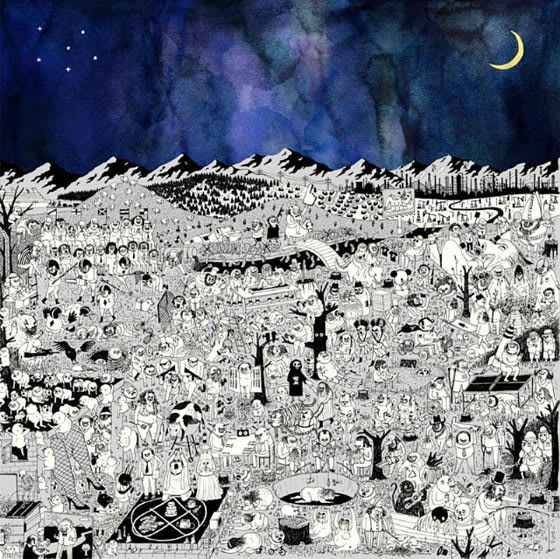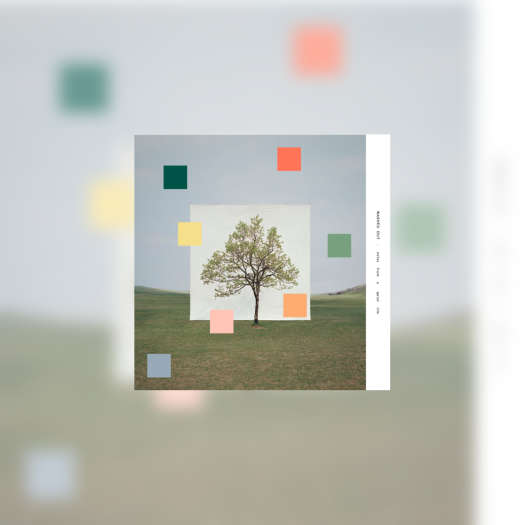"Leaving L.A." isn't the best song on Father John Misty's monumental third LP, Pure Comedy, but it's a fitting microcosm for it: The epic, 13-minute centrepiece is lyrically dense, slightly funny but mostly darkly straightforward and, despite a lack of strong hooks — or in this specific case, a chorus — warmly melodic and beautifully arranged.
Across ten verses, "Leaving L.A." skewers everything from artistic commodification to the music industry to gentrification, but it's the narrative arc it follows that's significant, demonstrating heretofore unheard soul-searching and depth from folk-rock's reigning satirist. The song begins by poking fun at "L.A. phonies and their bullshit bands," but just a few verses later, it's Josh Tillman himself in the crosshairs, as he targets his own "lack of skill," being "merely a minor fascination to manic virginal lust and college dudes" and, ultimately, the "ten-verse, chorus-less diatribe" of he song itself, as he imagines fans reacting to it: "I used to like this guy / But this new shit makes me want to die."
Like "Leaving L.A.," Pure Comedy begins with Tillman seemingly pointing his finger outward at the Western world: He lambastes religion on the opening title track and society's entertainment obsession on "Total Entertainment Forever" before delving into the complexity of privilege on "Things It Would Have Been Helpful to Know Before the Revolution," in which humanity "overthrew the system" only to rebuild it the exact same image.
Yet, as the album progresses, Tillman makes it clear that he's pointing in the mirror, too. On "Ballad of the Dying Man," he examines the inherent vanity of critiquing others, as a Misty-esque protagonist lashes out at "the pretentious, ignorant voices that will go unchecked" in his absence, only to check his news feed on the way out "to see what he's about to miss." On "A Bigger Paper Bag," he's a "fraud" and a "con," and back in the midst of "Leaving L.A.," he's just "another white guy in 2017 who takes himself so goddamn seriously."
If you listen closely, though, there's light in the darkness here, some evidence to back up Tillman's claim that Pure Comedy is, ultimately, a "love letter to humanity." A reference in "Things It Would Have Been Helpful to Know Before the Revolution" to Earth as a "godless rock that refuses to die" sounds cynical, but it's the foundation on which Existentialism, a liberated "humanism," is predicated. And though Tillman takes God to task on "When the God of Love Returns There'll Be Hell to Pay," it ends with humankind and their creator on equal, mutually sympathetic footing: "We just want light in the dark / Some warmth in the cold / And to make something out of nothing / Sounds like someone else I know."
It's dense, heady subject matter, which explains the more spacious, less ornamental sound compared to 2015's bombastic I Love You, Honeybear. That's not to say Pure Comedy is any less lush — "Things It Would Have Been Helpful to Know Before the Revolution" features a stirring string arrangement punctuated by sublime horn stabs, and the combined strings and piano reverberate luxuriously on "Two Wildly Different Perspectives" — but there's more room to breathe in these compositions, the product of Tillman's self-professed desire "to make music in the studio, instead of just making tracks."
At around 75 minutes, there's a lot — too much, some will inevitably say — to parse in Pure Comedy, but as with "Leaving L.A.," that feels like the point. If the ten verses of that lengthy song comprise the "portrait of a living, breathing human being smack in the centre" of this album about humanity, then the sprawling rest of it seemingly represents Tillman's ambitious attempt to capture as much of life as possible in one record. And he succeeds: Pure Comedy is packed with so much meaning and complexity, it feels as overwhelmingly absurd, joyous, curious, tragic, extraordinary and contradictory as life itself.
(Sub Pop)Across ten verses, "Leaving L.A." skewers everything from artistic commodification to the music industry to gentrification, but it's the narrative arc it follows that's significant, demonstrating heretofore unheard soul-searching and depth from folk-rock's reigning satirist. The song begins by poking fun at "L.A. phonies and their bullshit bands," but just a few verses later, it's Josh Tillman himself in the crosshairs, as he targets his own "lack of skill," being "merely a minor fascination to manic virginal lust and college dudes" and, ultimately, the "ten-verse, chorus-less diatribe" of he song itself, as he imagines fans reacting to it: "I used to like this guy / But this new shit makes me want to die."
Like "Leaving L.A.," Pure Comedy begins with Tillman seemingly pointing his finger outward at the Western world: He lambastes religion on the opening title track and society's entertainment obsession on "Total Entertainment Forever" before delving into the complexity of privilege on "Things It Would Have Been Helpful to Know Before the Revolution," in which humanity "overthrew the system" only to rebuild it the exact same image.
Yet, as the album progresses, Tillman makes it clear that he's pointing in the mirror, too. On "Ballad of the Dying Man," he examines the inherent vanity of critiquing others, as a Misty-esque protagonist lashes out at "the pretentious, ignorant voices that will go unchecked" in his absence, only to check his news feed on the way out "to see what he's about to miss." On "A Bigger Paper Bag," he's a "fraud" and a "con," and back in the midst of "Leaving L.A.," he's just "another white guy in 2017 who takes himself so goddamn seriously."
If you listen closely, though, there's light in the darkness here, some evidence to back up Tillman's claim that Pure Comedy is, ultimately, a "love letter to humanity." A reference in "Things It Would Have Been Helpful to Know Before the Revolution" to Earth as a "godless rock that refuses to die" sounds cynical, but it's the foundation on which Existentialism, a liberated "humanism," is predicated. And though Tillman takes God to task on "When the God of Love Returns There'll Be Hell to Pay," it ends with humankind and their creator on equal, mutually sympathetic footing: "We just want light in the dark / Some warmth in the cold / And to make something out of nothing / Sounds like someone else I know."
It's dense, heady subject matter, which explains the more spacious, less ornamental sound compared to 2015's bombastic I Love You, Honeybear. That's not to say Pure Comedy is any less lush — "Things It Would Have Been Helpful to Know Before the Revolution" features a stirring string arrangement punctuated by sublime horn stabs, and the combined strings and piano reverberate luxuriously on "Two Wildly Different Perspectives" — but there's more room to breathe in these compositions, the product of Tillman's self-professed desire "to make music in the studio, instead of just making tracks."
At around 75 minutes, there's a lot — too much, some will inevitably say — to parse in Pure Comedy, but as with "Leaving L.A.," that feels like the point. If the ten verses of that lengthy song comprise the "portrait of a living, breathing human being smack in the centre" of this album about humanity, then the sprawling rest of it seemingly represents Tillman's ambitious attempt to capture as much of life as possible in one record. And he succeeds: Pure Comedy is packed with so much meaning and complexity, it feels as overwhelmingly absurd, joyous, curious, tragic, extraordinary and contradictory as life itself.




